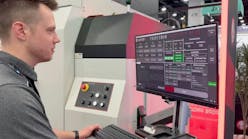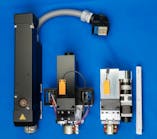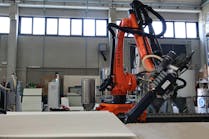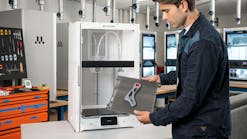Nordson Corp. jumped into the plastics processing machinery business in 2012 with a series of acquisitions that put its brand in front of some very well-known industry names.
Since then, Nordson has merged and mixed the disparate companies in its Polymer Processing Systems (PPS) business unit and found its sweet spot in the industry.
The first acquisition in 2012 was Extrusion Dies Industries in Chippewa Falls, Wis., a manufacturer of flat dies and extrusion coating lines. A month later, Nordson acquired Xaloy, New Castle, Pa., the largest manufacturer of screws and barrels in the U.S. and a big supplier of water-ring pelletizers, melt filters and screen changers. Xaloy had acquired the venerable Spirex screw and barrel brand a couple of years earlier.
The third major acquisition came a year later when it bought the Kreyenborg Group in Germany. The group consisted of two companies, one that made screen changers and melt filters, and a second that built pelletizers.
Nordson has long been a major player in the hot-melt adhesives industry and liked the packaging end market, with its steady, noncyclical growth. The company was looking for new business opportunities and decided the plastics industry — where it had no presence— offered good growth potential.
"The team that built the portfolio asked 'Where is the melt really controlled?' " John Keane, executive VP at Nordson, said during a recent interview. Those key touchpoints turned out to be where the melt is pumped, filtered and goes through an extrusion die and inside the barrel and screw areas.
"So, we said 'OK, we would like to be a player in all those areas,' " Keane recalled.
Nordson has never had the idea of buying companies and linking them together to be a machinery OEM. The focus from the beginning has been on components.
"I spend a lot of time telling our OEM partners that we want to sell you a really good component you can integrate into your machine," Keane said. "Once I design it, I am part of your life. I can spend my money on maintenance and service.
"Every machine an OEM sells pulls through one of our components," Keane said. "We can make investments on the back side for service. Since we are touching the melt, if there is a problem with the end product, chances are we have a role in that. If there is an opportunity to improve a product, we have a role in that, too."
Keane said no matter where the equipment that contains a Nordson component ends up, "We want to be around the corner to take care of it. That includes maintenance, upgrades or whatever else the customer needs.
"We want our service guys to be more than wrench turners," he said. "We want them to understand how the melt is transformed as it flows through the equipment, so we can find ways to make improvements."
Nordson's individual PPS businesses have undergone significant global expansion as the company pursues OEM partners and seeks to improve manufacturing efficiencies.
Nordson PPS now employs 1,200 and is hiring around the world.
Publicly traded Nordson had sales for the fiscal year ending Oct. 31 of $2.07 billion. The company does not report sales of individual business units, but Keane said PPS accounts for about 10 to 15 percent of sales, or $200.7 million to $300.9 million.
He said he wants every OEM as a customer but admits Nordson PPS walks a fine line in selling components to competing OEMs. "We are very protective of an OEM's information. At the end of the day, we have never burned anybody, so they trust us.
"We compartmentalize the information. Two competing companies are serviced by two different groups of people in our company. We read everybody the riot act so they understand they never talk about their customer's information except to the customer," he said.
That means a product developed for one customer cannot be sold to another customer. "That is the nature of our business," Keane said. "Everything we make is engineered. There is not a standard solution. Each part we produce is unique to that OEM."
It also means Nordson PPS spends 5 to 10 percent of its budget on R&D. "We have a lot of engineers. A lot of our R&D occurs on an order."
Keane said Nordson sees the best growth potential in its melt-delivery, pumps and filtration businesses because those products are widely used.
He said other companies are putting together business portfolios similar to Nordson. "It feels like we all simultaneously arrived at the same answer. Our challenge for PPS now is to build a sense of one business with multiple product lines instead of four or five separate businesses."
Are there holes in the PPS portfolio of companies that need to be filled?
"We are always shopping," Keane said. "As markets grow, there will be new opportunities for us. If somebody has a better widget and we can jump-start something with an acquisition, we will look at it."
Ron Shinn, editor
Ron Shinn | Editor
Editor Ron Shinn is a co-founder of Plastics Machinery & Manufacturing and has been covering the plastics industry for more than 35 years. He leads the editorial team, directs coverage and sets the editorial calendar. He also writes features, including the Talking Points column and On the Factory Floor, and covers recycling and sustainability for PMM and Plastics Recycling.







